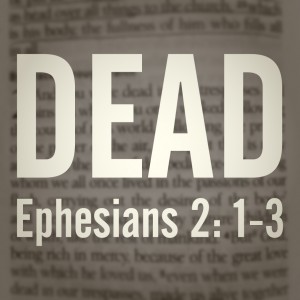In the New Testament, the word “dead” (Gk., nekros) means “lifeless, useless, or separated.” Never does it mean “nonexistent” (Vance, Other Side of Calvinism, 220).
 Very rarely does it refer to something that is completely unable to act.
Very rarely does it refer to something that is completely unable to act.
Examples of “Dead” in Scripture
So, for example, the prodigal son was “dead” to his father while he was separated from him (Luke 15:24, 32). While the prodigal son was in the far country, he certainly existed and was certainly active, but was not functioning properly in his role as a son.
In James 2, faith is described as “useless” and “unprofitable” when it is separated from works. Dead faith is not a nonexistent faith, but a separated or useless faith. This means that even Christians can have dead faith.
This idea is brought out by the Apostle John as well in the last book of the Bible, when he records the Letters to the Seven Churches. In Revelation 3, even living Christians can be described as “dead.” In the Letter to the Church of Sardis, the Christians are described as having life, but being dead, because there was a problem with their works (Rev 3:2-3).
In all these examples, the word “dead” can be best understood as “separated,” or “ineffective and useless at its intended purpose.”
7 Different Kinds of Death in the Bible
Once we begin to see that this is the definition of “dead” in Scripture, we can discern at least seven different kinds of death (or separations) in the Bible.
- There is spiritual death, where the spirit is separated or cut off from God, and so is ineffective or useless in helping the person connect with God and live as they should (cf. Gen 2:17).
- There is physical death, which is where the body is separated from the soul and the spirit (Heb 9:27; John 11:11-17). It is physical death that most people think of when they refer to “death.”
- Thirdly, there is eternal death, which is when a person is separated eternally from God (Rev 20:14; Matt 25:46).
- There is positional death, which occurs when believers die to sin as a result of undergoing death and resurrection through Jesus Christ (Rom 6:3-6; Gal 2:2).
- There is relational death, which occurs when we are separated from friendships and relationships as a result of sin (Luke 15:24; 1 Tim 5:6; Rev 3:2-3).
- Sixth, there is an operational death, which is when we are unable to function and operate for our intended purposes because we rely upon works of the flesh or refuse to act upon what we believe (Jas 2:14-26; Heb 6:1; 9:14).
- Finally, there is sexual death, which occurs when a person’s sexual organs are no longer able to function as they were intended (Rom 4:17-19).
“Dead” Means “Separated”
As can be seen, in every single case, good synonyms for “death” might be “separation” or “uselessness.”
- Spiritual death is separation from God, or uselessness for God.
- Physical death is the separation of the soul from the body, and when this happens, the body become useless.
- Eternal death is separation of the body, soul and spirit from God forever.
- Positional death is separation of the believer from what he used to be in the old man, so that in our new man, are no longer useful for sin, death, and the devil.
- Relational death is the separation of fellowship from friends, family members, and even from God.
- Operational death is separation from right living, and a right testimony toward others.
- Finally, sexual death is a separation from the ability to physically reproduce.
Dead Does not Mean “Total Inability”
Obviously, none of these uses of the word “dead” in Scripture imply “total inability.”
Quite to the contrary, we often find that after people are described as being “dead” in one of the ways listed above, they are then invited in the following context to turn from death and practice life.
So in passages like James 2:14-26 and Revelation 3:1-6, people are called to reverse their state of death by energizing their faith or repenting and returning to the way they used to live.
At the same time, when Paul writes that in Christ we are “dead to sin” (Rom 6:3-6; Gal 2:2) this does not mean that Christians have a “total inability” to sin, or that there is no sin in the Christian’s life. Far from it! We all sin every day. What Paul means is that the Christian is separated from sin. We are no longer ruled by sin. We are no longer in bondage to sin. But we do still sin, as every Christian knows.
I included this study here today because tomorrow we are going to look at Ephesians 2:1-3, which is a popular Calvinistic proof text for total depravity and total inability, and I wanted to get the definition of “dead” out of the way now. What are your thoughts on the word “dead”? When you read this word in Scripture, how do you understand it?
If you want to read more about Calvinism, check out other posts in this blog series: Words of Calvinism and the Word of God.



 It is common among Calvinistic teachers and authors to say that the reason unbelievers cannot believe the gospel is because their minds have been darkened by the god of this age.
It is common among Calvinistic teachers and authors to say that the reason unbelievers cannot believe the gospel is because their minds have been darkened by the god of this age. What this means is that when Paul talks about blindness and the veil in 2 Corinthians 3–4, he is not talking primarily about how a person receives eternal life by faith in Jesus Christ, but about all the other truths of the gospel which are contained in the rest of Scripture, and which are centered on the person and work of Jesus Christ.
What this means is that when Paul talks about blindness and the veil in 2 Corinthians 3–4, he is not talking primarily about how a person receives eternal life by faith in Jesus Christ, but about all the other truths of the gospel which are contained in the rest of Scripture, and which are centered on the person and work of Jesus Christ.
 Regarding this verse, Calvinists are not shy in stating their beliefs about what it teaches.
Regarding this verse, Calvinists are not shy in stating their beliefs about what it teaches. These three types of people reflect the three part of a person which we looked at in the
These three types of people reflect the three part of a person which we looked at in the 
 Furthermore, it could also be argued that when Paul says the natural man “does not” receive the things of the Spirit of God, “nor can he know them,” he is not referring to an inherent inability to do so, but rather to an antagonistic mindset that refuses to seek the truth and understand these things.
Furthermore, it could also be argued that when Paul says the natural man “does not” receive the things of the Spirit of God, “nor can he know them,” he is not referring to an inherent inability to do so, but rather to an antagonistic mindset that refuses to seek the truth and understand these things.




 Calvinists sometimes quote from Romans 7 as a text which teaches Total Depravity and total inability, for Paul seems to describe a lack of ability to do anything good (Romans 7:15, 19, 24), and refers to being captive and enslaved to sin (Romans 7:14, 23). Paul says that although he wants to do what is right, he ends up doing what is wrong. Romans 7:19 one such verse which sums up the struggle nicely:
Calvinists sometimes quote from Romans 7 as a text which teaches Total Depravity and total inability, for Paul seems to describe a lack of ability to do anything good (Romans 7:15, 19, 24), and refers to being captive and enslaved to sin (Romans 7:14, 23). Paul says that although he wants to do what is right, he ends up doing what is wrong. Romans 7:19 one such verse which sums up the struggle nicely:
 Yet although Christians gain the illuminating and empowering influence of the Holy Spirit when we first believe in Jesus for eternal life, we all know that the struggle with sin did not cease. It continues daily. Yes, victory is now possible, for greater is He that is in us than He that is in the world, but this does not mean that the struggle against the flesh is gone. We too, along with Paul, often cry “Who will deliver me from this body of death?”
Yet although Christians gain the illuminating and empowering influence of the Holy Spirit when we first believe in Jesus for eternal life, we all know that the struggle with sin did not cease. It continues daily. Yes, victory is now possible, for greater is He that is in us than He that is in the world, but this does not mean that the struggle against the flesh is gone. We too, along with Paul, often cry “Who will deliver me from this body of death?”